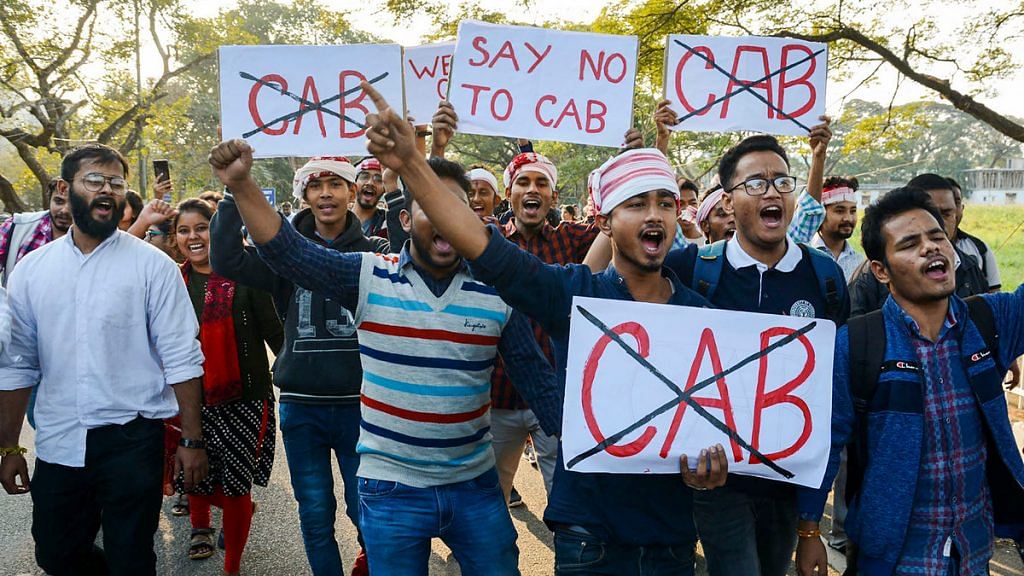New Delhi: Even before the Citizenship (Amendment) Bill 2019 became a law, three chief ministers had declared that they won’t implement it in their states.
The bill, which was signed unto law by President Ram Nath Kovind late Thursday, promises citizenship to non-Muslim illegal migrants of six communities — Hindus, Christians, Sikhs, Parsis, Jains and Buddhists — from Pakistan, Afghanistan and Bangladesh.
It has been criticised for excluding Muslims, and massive protests have broken out across the country over its rollout.
West Bengal Chief Minister Mamata Banerjee was the first to voice her objection, declaring at rally earlier this week “we will never ever allow it in Bengal”.
Banerjee was followed by Punjab Chief Minister Amarinder Singh and his Kerala counterpart Pinarayi Vijayan — both saying the citizenship law will not be implemented in their states.
Madhya Pradesh Chief Minister Kamal Nath too hinted that his government may resist the implementation of the Act in the State and will follow the Congress’ stand on the matter.
But is it constitutionally possible for these states to resist implementation of the law? Experts do not think so.
Also read: On Citizenship Bill, Modi and Amit Shah don’t really care what Supreme Court will say
What Constitution says
Citizenship, naturalisation and aliens fall in the Union List in the Constitution of India, empowering the central government to make laws on the subject.
Additionally, Article 256 of the Constitution makes it a state’s obligation to ensure compliance with central laws.
The Article states, “The executive power of every State shall be so exercised as to ensure compliance with the laws made by Parliament and any existing laws which apply in that State…”
‘States have no choice’
Senior Advocate K.T.S. Tulsi told ThePrint that states do not have a choice in the matter.
“The states will have to act on the basis of the law, as enacted. The union law prevails over state law. So I don’t think the states will have a choice,” he said.
“Maybe they are just expressing their unwillingness to toe the line, but when it comes to the crunch, they’ll have to.”
If they resist, Tulsi said, the high courts will enforce it.
Also read: CAB protests a battle for India – either we are a secular state or we aren’t India at all
Former Lok Sabha secretary and Constitutional expert P.D.T. Achary also agreed with this viewpoint.
“Constitutionally, it isn’t possible for the states to say that they will not implement the law made by Parliament. The Constitution requires the state to implement the law made by Parliament; the Constitution is clear on this. So, states do not have any option,” he said.
“If they resist, the central government can intervene and take over the administration of the state.”
Non-cooperation but not without consequences
Senior advocate Gopal Sankaranarayanan told ThePrint that while states could show resistance by refusing to cooperate in implementation of the Act, this won’t be without consequences.
“Despite the fact that it is a central enactment and citizenship is purely a national federal issue, when it actually comes to its implementation on the ground, they would need the assistance of the local authorities — both civil and judicial. For this, they would need the police and the administrative machinery on the ground,” he said.
“All these are essentially under the administration of various states. If the states ensure that their machinery does not cooperate on this issue, then it’ll become very difficult for them to implement it in certain parts of the country,” added Sankaranarayanan.
On being asked what would happen if the states continued to resist, he said this could instigate the central government to claim a breakdown of constitutional machinery in the state and impose President’s Rule in the state.
“This is a possible consequence if the states continue along this path. And it would be difficult to fault the central government for implementing it, because the idea is that there should be cooperation,” he said.
Also read: Assam’s fears rooted in history, unlike the communal spin Indian ‘intellectuals’ gave to CAB
